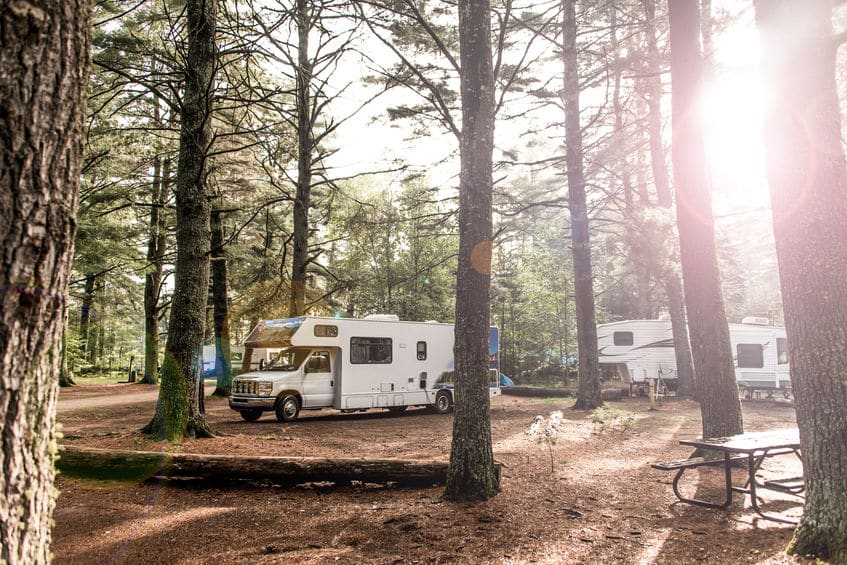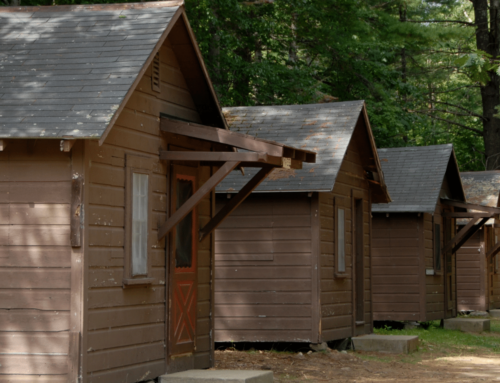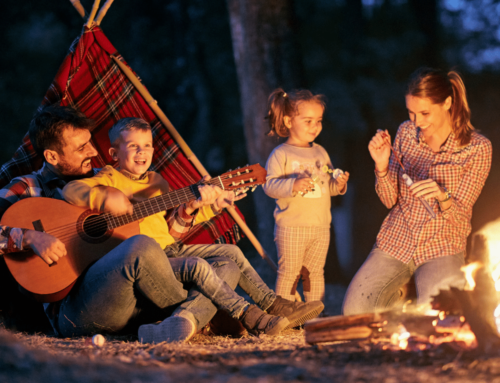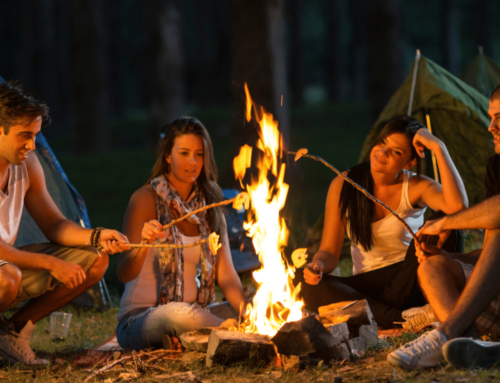YOUR GUIDE TO COLD WEATHER RVING
While some families or groups might pack up their RV and head south in the winter, others might stick around to enjoy the sparkling snow, peaceful woods and quiet campgrounds like here at Acorn Acres. Winter RV camping can offer a break from the bustling summer season and give you a chance to relax in the beautiful snowy outdoors. Winter RV trips can also be an affordable way to explore and enjoy outdoor winter recreation. If you are considering taking your RV out this winter, don’t let the cold weather get in your way. Use this guide to cold weather RVing to stay warm and safe during your wintertime RV camping adventure.
PREPARING YOUR RV FOR A COLD WEATHER TRIP
It is important to make sure that your camper is the best condition before you embark on a winter RV trip. No one wants to deal with mechanical issues when camping, especially in the cold. By preparing your camper for harsh weather, you will want to protect your engine and other RV components from freezing and other potential damage. Also making sure that you RV is adequately insulated and will be able to keep you and your family warm. No one wants to be cold in their RV after being cold outdoors, it can really put a damper on your winter camping experience.
We have provided five ways to prepare your RV for a winter camping trip:
1. INSTALL & UPGRADE RV INSULATION:
Installing insulation is one of the best and simplest ways to keep your camper warm in the winter. Having RV insulation can protect many vehicle components from damage and can help create a warm and toasty living space for you and your family. Installing insulation around the base of the RV can also effectively block cold winter winds from damaging RV piping and sucking heat out of the camper. If you are heading out for a winter RV camping trip, like at Acorn Acres, try these tips for how to insulate a camper trailer and RV underbelly for cold weather camping:
- Seal the windows and doors. You will want to examine the seals and caulking around your RV windows and replace any areas that are missing or weak. You might also need to replace any weather stripping around exterior doors to prevent cold air or moisture from leaking in.
- Install window coverings. Window film and reflective foil are affordable and effective options to further insulate your RV windows. You can easily cut foil-lined reflective insulation to fit your RV windows perfectly. As an added bonus the foil helps reflect the heat back into the camper.
- Heavy drapes. Purchasing thick fabric drapes can also help to block any cold drafts coming in around the windows and keep warm air in during chilly evenings. You can also use insulated curtains to separate the cockpit from the living space, giving you a smaller area to heat.
- Insulating the floors. Foam board flooring can be used to insulate the RV floor. If you prefer not to purchase foam board flooring or want a faster solution consider using heavy rugs or carpets as they too can help block cold air that may come up.
- Install RV skirting. Wind blowing underneath your RV can cause your water tanks to freeze and can also suck the heat out. Installing RV skirting around the base of your RV can help to block out any cold winds from damaging vehicle components as well as chilling the interior. Foam boards can also be used with or instead of skirting to better insulate the base of your RV.
Don’t want to insulate your RV just to have to change it up in the summer? Well you won’t need to make much adjustments come summer time becase RV insulation can remain installed almost all year and requires very little yearly maintenance. The window foil insulation can be easily rolled up and stored during warmer months, and RV skirting can be used year round or stored in the summer.
2. PROTECT YOUR RV PLUMBING:
Freeze-ups are a common challenge when it comes to RV camping in the winter. This can also lead to plumbing damage. When ice expands in the pipes and hoses, this can cause them to crack or burst if not properly insulated. Keep your water flowing this winter by following these tips for keeping RV pipes from freezing while camping:
- Use heat tape on pipes and hoses. You will want to wrap your freshwater hose and sewer hose with heat strips to keep the lines warm and prevent freezing. You can also apply heat tape around the valves and connections that most at risk for freeze-ups. You might also consider adding foam insulation, in addition to the heat tape, for extra protection.
- Warm your internal plumbing. Open your bathroom and kitchen cabinets, so your trailer’s heating can keep your internal plumbing warm. Also allowing a small drip from faucets can help to combat freezing by keeping water moving inside the pipes.
- Use the internal freshwater tank. Instead of connecting your RV to external water sources, fill the internal freshwater tank to use as your primary water source. This allows you to disconnect and safely store your freshwater hose.
- Use a space heater. If the water lines or water pump in your RV are not protected by a heat source, then you can use a small space heater to help prevent freezing. You will want to practice safety precautions by keeping space heaters the appropriate distance away from RV components and vents.
- Adding antifreeze. You can add a small amount of antifreeze in holding tanks to help protect the valves from freezing.
- Dump tanks wisely. Be sure to only dump tanks when they are full to reduce the risk of freezing. You should also keep waste valves closed when not in use.
3. TAKE CARE OF YOUR RV ENGINE:
RV engines and engine components will need extra protection to withstand extreme winter temperatures. Before heading out to Acorn Acres for some winter RV camping, you will want to have your RV inspected for any signs of corrosion or damage. You will also want to make sure that your batteries are fully charged and securely connected. If you have batteries that are only partly charged then they are much more likely to freeze or die in colder temperatures.
Check your engines antifreeze and refill it with the proper concentration of antifreeze and water. While water may be effective for cooling an engine in warmer months, in the winter months you will need to use at least 50 percent antifreeze and is essential for RV camping in freezing temperatures. For camping in very cold regions, using an engine block heater can provide additional protection. Engine block heaters are meant to warm up your engine before you start it. You will want to run it for about four to five hours prior to starting the engine if the temperature is below freezing.
4. PREPARE YOUR RV FURNACE:
Be sure to check your RV furnace before your winter camping trip to make sure that it is working properly and in good condition. It is best to have an inspection performed by a certified RV repair technician especially if you are camping in extremely cold temperatures. You should also clean your furnace using compressed air or a soft brush to remove any dirt and debris. Also make sure to check the furnace vents for any damage or obstructions that could prevent air from flowing properly and check that the furnace air return is not blocked.
When heating your RV in winter, you may also decide to use additional heat sources. Space heaters and catalytic heaters can also make a huge difference for staying warm in a camper in winter. Keep in mind that these heating methods can add moisture into the air that might cause damage to your engine and other RV components. Condensation in the engine or pipes can cause corrosion, and moisture inside your RV can possibly lead to mold. You will also want to use a dehumidifier to remove any excess moisture if necessary and keep your RV warm and dry.
5. OTHER TIPS FOR WINTERIZING YOUR RV:
When operating and living in a travel trailer during winter, there are many precautions you can take to prevent freeze-ups and stay warm. Here are a few more tips for preparing your RV for a cold weather trip:
- Prevent stabilizing jacks from freezing. When parking your camper in snowy or icy conditions, there is a chance that your stabilizing jacks could get stuck to the cold ground. You should place wooden blocks underneath the jacks to help prevent them from sticking.
- Cover your AC unit. When camping in the winter, there is no need to run your RV air conditioning. You will want to use an insulated AC cover to protect your AC unit while it is not in use and prevent cold drafts.
- Install vent covers. RV vent covers allow you to keep your air vents open in any weather without any snow or rain getting into the trailer. Having the air vents open reduces the risk of carbon monoxide poisoning if you run a portable heater inside your camper, and the open vents can release humidity to keep your RV dry, too.
- Take care with plastic components. In extremely cold temperatures, plastic parts of your RV, such as levers and trim, can become brittle. Handle plastic components with care in order to prevent breakage.
- Change batteries in safety devices. When running space heaters inside your RV, it is essential that carbon monoxide detectors and fire alarms are working as they should. Test these safety devices and change the batteries before your winter trip.
We want you to be comfortable and warm when you visit Acorn Acres so you can have an enjoyable time while here. Make sure you RV is in proper working order and is able to withstand the weather conditions. We hope to see you at Acorn Acres soon!





